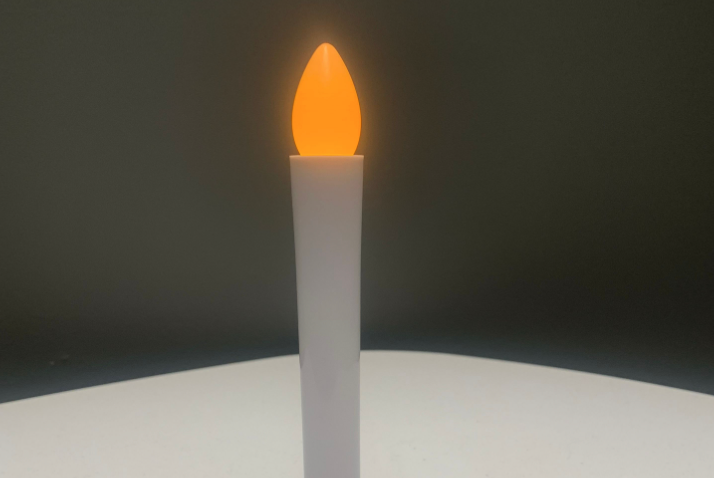Take Back the Night (TBTN), the annual event dedicated to giving power back to survivors of sexual violence, took place Monday, April 3 in the John Lewis Student Center.
The gathering was hosted by VOICE, the Institute’s sexual and relationship violence prevention and survivor support initiative based in the Wellness Empowerment Center (WEC).
Doors opened at 6:30 p.m. in the Atlantic Theater for a brief run through. Beginning at 7 p.m., the gathering heard opening statements from Jennifer Gagen, VOICE Advocate.
Given the sensitive nature of the program, Gagen advised attendees to prioritize their own well-being and informed the audience of on-site resources including therapists and a quiet room
located further down the hall.
The majority of the program was led by the survivors. Students submitted their stories in advance and spoke on their experiences at their discretion.
Authors were given the option to read their stories themselves or have them read anonymously by someone else; a few read their own story while accompanied on stage with a friend.
Some speakers shared statistics, some chose to speak directly on the incident, while others focused more on the aftermath of trauma and how they were supported in the healing process.
Linking every story was a notion of personal blame and the broader affirmation to all those listening that survivors are not at fault for their experience. Ultimately, the night was defined by a sense of hope, resilience and support from allies.
After the shared stories, lights were dimmed for Infinite Harmony, the Institute’s co-ed a capella group to perform while the audience lit electronic candles and held them in honor of all survivors at Tech.
The Technique sat down for an interview with Gagen and Susannah Fulling-Smith, VOICE Health Educator, for more information on the program.
Gagen began by explaining the goal of the gathering as the hope that “TBTN is the start of a conversation and that people transform their feelings into action to support survivors, be active bystanders and prevent all forms sexual violence.”
When asked about the history of TBTN at Tech, Gagen said, “TBTN dates back to 1994 at GT. The WRC [Women’s Resource Center] has been a long-time leader of this event and it used to occur in March during Women’s Action Month. In the last decade plus, WRC and the office now called Wellness Empowerment Center have teamed up to run the event each year and it has moved to April during Sexual Assault Awareness Month.”
Fulling-Smith also explained that while TBTN at Tech typically follows the format described earlier, it is an event held across the nation on college campuses and is acknowledged in a variety of ways, “some [campuses] march, others hold public demonstrations.”
According to their website, takebackthenight.org/history, TBTN is an international foundation with roots in the 1970s. The foundation was created after a wave of violence against women in Philadelphia, San Francisco and Los Angeles received national media attention.
Women across the world began to organize, focusing on socially institutionalized systems of sexual violence under the “Take Back the Night” moniker, staging a variety of demonstrations. The demonstrations were often intersectional in nature, protesting against the intertwined systems of sexism, racism and homophobia according to informational materials provided on their website.
Although the event centers potentially triggering content, Gagen said, “we tend to get really positive feedback, that people feel inspired and have a better understanding of the impact of sexual violence at GT. It is a serious event, so it’s also normal that people leave with mixed feelings — sad but hopeful, angry but motivated.”
In line with this statement, Gagen went on to explain that students “may be considering for the first time that an incident was abusive or non-consensual and that what they’ve been feeling are actually symptoms of trauma. We hope those students feel believed and affirmed.”
Echoing this sentiment, Fulling-Smith explained that her role as an educator with the Institute came about as they realized that concepts such as consent and abuse can often be more complicated than people initially might believe and that this can lead to “a lot of misunderstanding,” even in the best-case scenario.
On her role as an educator Fulling-Smith said, “the cultural messages we hear about what it means to be a man or a woman, those gender stereotypes, how that impacts our relationships; when we talk about ending sexual violence, we’re looking at ending some of those cultural things that have been in the messages we’ve heard since childhood.”
Going on to focus on what issues the WEC aims to address, Gagen clarified, saying “SV [sexual violence] is an umbrella term that encompasses sexual assault and rape, intimate partner violence, sexual harassment and stalking.”
In terms of student resources for those in need, Gagen said, “VOICE is a great starting point because it’s confidential and available 24 hours per day by calling 404-894-9000. The Center for Mental Healthcare and Resources is also a great place to start because they have an intake center and can connect students to ongoing mental health counseling among other resources.”
Students can visit voice.gatech.edu for a full list of resources provided by the Institute, many of which are confidential.
